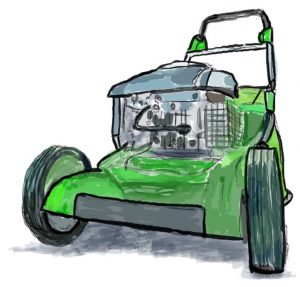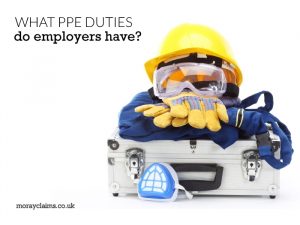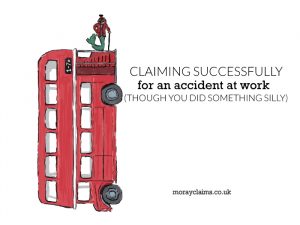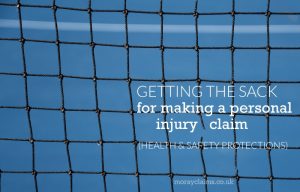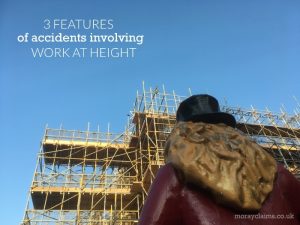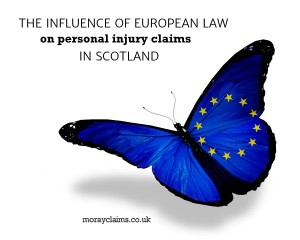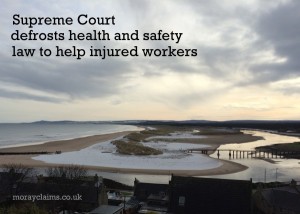Moray Claims is a trading name of Grigor & Young LLP, Solicitors. Grigor & Young have offices in Elgin and Forres, Moray. Accidents at work cover a wide range of accidents. If we take on your claim at G&Y, we will do so in one of three ways. Legal aid Eligibility for legal aid will depend on your financial circumstances. If you qualify for legal aid, we will give serious consideration to using that as the funding mechanism for the claim but we will also discuss with you the other options mentioned below. Note that if your claim is successful under any form of Scottish legal aid, you will receive 100% of your compensation. The legal aid rules prevent your solicitor taking any form of Success Fee as a deduction from your compensation. "Before the event" (BTE) insurance This is a type of legal expenses insurance which you may have attached to buildings or contents insurance, for example. Many people have this type of legal expenses insurance cover Continue Reading
How an “off” petrol lawnmower can still be a powered-blade injury risk
Imagine you've been cutting grass with a self-propelled rotary petrol mower - like the ones shown in various images in this article. (You don't 'push' such lawnmowers. They are propelled along by their engines). You stop the engine to adjust the height of the blade. While you're doing that, completely without warning and unexpectedly, the motor restarts of its own accord. The blade spins into action and you suffer serious injury to your hand as a result. Statistics from the USA show that there was an average of about 85,000 lawnmower-related injuries annually in the period 2005 to 2015. The most commonly injured body parts were the hand/finger (22%) followed by the lower extremities (i.e. toes) (16%). Men were more than 3 times as likely to be injured as women. The annual number of lawnmower-related injuries showed no decrease during the period 2005 to 2015. The purpose of this article is to highlight a particular risk associated with petrol-driven Continue Reading
When being even 10 per cent to blame for your own injury is too much
“Can I buy or sell a house without a solicitor?” Grigor & Young have newspaper cuttings books back to the 19th century, and that’s how one cutting from the mid-1980s is headlined. The body text continues: “In theory, you can do much of the work yourself. In theory, you can also remove your own appendix – given a sharp knife, a reliable textbook and a bit of practice.” Seth Godin picked up on this theme of expertise in a post on his daily blog. He asked: “Okay, how hard can it be? (to be an expert). Actually, it might be very hard. Actually, expertise has value. Actually, just because someone said it on the internet doesn’t mean it’s true. Or useful.” What’s the chance you’d be able to do such conveyancing or (especially) surgery yourself? Limited, you would think. Less than 10%? Less than 1%? And a small chance is what you would expect to have, in general, if you were hoping to overturn a finding of 10% contributory negligence in a personal injury Continue Reading
What PPE duties do employers have?
How bad for you is 37 grammes of saturated fat? According to recommendations from the US Department of Agriculture (USDA) in 1992, a normal diet should contain no more than 20 grammes of saturated fat per day. Do you have any idea what 37 grammes of saturated fat looks like? USDA research found that a typical medium-sized bag of film theatre popcorn contained that much saturated fat. But unless you’re a nutritionist, the bare quantity '37g' might not be too great in convincing you of the riskiness of your movie-time snack. Instead, USDA got their message across by highlighting the other foods which taken together would contain the same dosage of artery-clogging fat as the apparently innocent between-meals filler - A Big Mac with chips, plusA bacon and eggs breakfast, plusA steak supper with all the trimmings, equals37g of saturated fat. The scientific analysis of the popcorn amounted to a risk assessment. USDA needed to get the hazardous results across to the Continue Reading
Claiming successfully for an accident at work though you did something silly
Have you ever panicked that you have mislaid your mobile phone? And that while you are in the middle of a conversation with someone on your mobile phone? This happens to me regularly. So many things compete for our attention and so much of the activity that fills our day is done almost unconsciously, on autopilot. The repetitiveness of everyday life dulls our concentration and our short-term memories. Sometimes distractions can be a source of danger, whether that’s while you’re descending the stairs in your house or crossing the street or working on a production line. In this article we are going to concentrate on accidents at work. We will look at 3 different accident scenarios where you might think the injured employee 'should have known better' yet still claimed successfully. Firstly, we’ll look at the case of the exposed window cleaner. Then, we’ll go on to consider the case of the labourer with inappropriate footwear. Finally, we’ll go over the case of the bus Continue Reading
Why employers face greater risk from injury claims due to employee negligence
Who you claim compensation from via a personal injury claim is not always as obvious as it may appear. In a road traffic accident, it’s the negligent driver who injured you that’s first in line. But it’s usually their motor insurer who pays the compensation. And it’s that insurer you will sue if you have to raise a court action to ensure your claim succeeds and you secure a reasonable level of compensation. If the driver was at work at the time of the accident, you might also have a claim against the driver’s employers under the law of vicarious liability. What do we mean by vicarious liability? “Vicarious” experience is where you live your life through the experience of another person, as a housebound parent might experience the wider world through their student child reporting back on travels during a gap year. Or a precocious child, such as Calvin from Calvin and Hobbes, might claim that his Dad is trying to live Calvin's life vicariously because Calvin's Dad's life is Continue Reading
Getting the sack for making a personal injury claim (health and safety protections)
The fear of being dismissed. It’s a fear that prevents many people claiming compensation for personal injury sustained at work. We’ve considered this general issue in other articles. In this article, we focus on protections which might apply via employment law, and health and safety law. It’s a discussion of health and safety at work, workplace danger and sections 44 and 100 of the Employment Rights Act 1996. Employers have extensive health and safety duties towards employees. And also to workers, self-employed people and visitors to their workplaces. The principal legislation in relation to health and safety is the Health and Safety at Work Act 1974. This sets out basic health and safety duties. They apply to companies, directors, managers and employees. As the director or owner of a company, you have potential personal liability as well: you can't hide behind your company. The nature and extent of the duties in practice will depend very much on the type of business concerned. The Continue Reading
3 Important Features of Accidents involving Work at Height
Sunday, 26 August 2018 marked the 90th anniversary of the “snail in the ginger beer bottle” incident. While enjoying a drink with a friend in the Wellmeadow Café in Paisley, May Donoghue found an unwelcome addition to the contents of her bottled drink in the form of a decomposing snail. The injury she suffered when she drank the unpleasant mixture gave rise to the case of Donoghue –v- Stevenson, one of the most famous personal injury cases of all time. Though you would more readily link cheese with a mouse than ginger beer with a snail, it was ironic that a dead animal should again feature in a personal injury scenario reported so close to Donoghue –v- Stevenson’s 90th anniversary. On 22 August 2018, Kirkwall Sheriff Court dealt with a criminal prosecution arising out of an accident in a cheese factory in Orkney. A dead mouse caused an employee to have to work at a height from which he (the employee) fell and suffered injury. In this article, we will look at three aspects of work Continue Reading
The Influence of European Law on Personal Injury Claims in Scotland
'What have the Romans ever done for us?' is one of the most quoted scenes from Monty Python's iconic film, Life of Brian. John Cleese as Reg, leader of The People's Front of Judea, poses the question at a secret meeting of the group, expecting no or few positive responses from his colleagues. This, he hopes, will reinforce the group's resolve to overthrow their 'pointless' and unwelcome rulers. Instead, their brainstormed list of the benefits of Roman occupation grows and grows, with great comic effect. Exasperated, in an effort to bring the discussion to an end, Reg snarls: 'Alright - but apart from sanitation, medicine, education, wine, public order, irrigation, roads, the freshwater system and public health ... what have the Romans ever done for us?' (The next and final answer, before the meeting is suddenly interrupted by a threatening knock on the door, is: 'Brought peace'). The serious point, well made by this film scene, is that the influence of the Roman Empire in the Continue Reading
Lifting Operations Accident In Moray Firth Harbour Caused By Confusion In Communication
Confusion in communication is a common cause of accidents. It seems to have played a central role in a serious incident on the coast of the Moray Firth, recently reported on the Health and Safety Executive (HSE) website. A worker suffered facial and hand injuries as a result of an accident in Wick Harbour in January 2013 Brian Reid (‘R’), who was employed by a subcontractor, was lowered into the hold of a ship in a man riding basket lifted by a crane. Wind turbine components were to be unloaded from the ship. R was removing sea fastenings to enable the unloading to take place. Hugh Simpson (Contractors) Limited (‘HSCL’) was in charge of the lifting operation. Neither the basket nor R could be seen by the crane operator whilst R was in the hold of the ship The employee of HSCL who was in charge of lifting operations on the day was on the deck of the ship to provide a communication link between R and the crane operator by means of hand signals. After R had removed one of the sea Continue Reading
Manual Handling Accidents
In rural California in the mid-1980s, Mike Yurosek had a problem which was common to all carrot farmers. More than half his crop was going to waste because it was considered too ‘ugly’ for retail. Carrots which were malformed, crooked or too large were written off as unsaleable and consigned to the bin. After some experimentation and some false-starts with different cutting implements, Yurosek settled on an industrial green-bean cutter, which cut the second-class carrots into regular 2-inch pieces. Unsure as to the reaction he would get, he sent a free bag of the alternative carrots with the usual delivery to one of his local retail clients. Next day, they called him to say that from then on they only wanted the new design of carrots. Yurosek had invented the ‘baby carrot’. In so doing, he lifted the carrot industry out of a rut. By 1987 – the year after his discovery – carrot consumption in the U.S. had risen by 30%. In the decade to 1997, carrot consumption doubled. Continue Reading
Slip On Ice At Work Case Clarifies Law On Workplace Personal Injury Claims
Imagine you're employed as a home carer in Scotland. Your work requires you to go out at all times of day and in all kinds of weather to provide personal care to the elderly, vulnerable and terminally-ill. One night in winter, with snow and ice lying on the ground, you slip and fall as you make your way to one of your client's homes. You break your wrist. The flat boots you were wearing had ridged soles but their grip was not enough to keep you upright. It turns out that crampon-like shoe attachments were available at reasonable cost and they would probably have prevented your fall if your employer had given you them to use. In other words, you can argue that your employer failed to take proper care for your safety, by failing to provide adequate personal protective equipment, so you have a right to claim compensation from them for your injuries and other losses. On the other hand, periodic sub-zero temperatures are a fact of life in northern Europe, aren't they? Anyone Continue Reading
